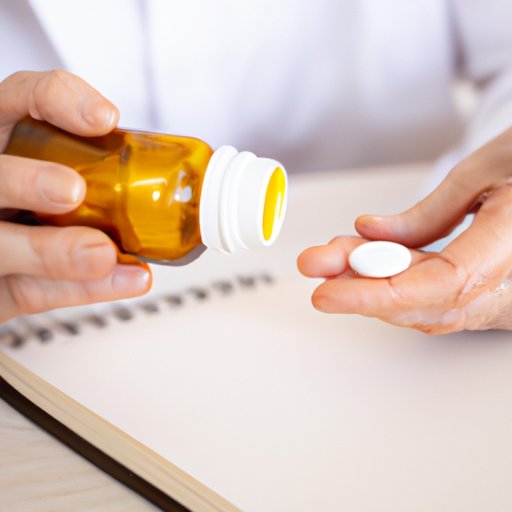
Introduction
Vitamin D is essential for maintaining good health, yet many people are unaware of the appropriate daily intake required to achieve this. In this article, we will explore the importance of vitamin D, the recommended daily amount of vitamin D, and how to get enough of it through food and supplements. We’ll also examine the risks of overdosing on vitamin D and its link to common health issues.
Why Getting Enough Vitamin D is Important for Your Health
Vitamin D plays a crucial role in maintaining good health. It is responsible for regulating the absorption of calcium and phosphorus in the body, which are necessary for the development and maintenance of healthy bones, teeth, and muscles. Vitamin D deficiency has been linked to an increased risk of several health problems, such as osteoporosis, rickets, and various forms of cancer.
Understanding the Right Dosage of Vitamin D: How Much Do You Actually Need?
The optimal daily dose of vitamin D varies depending on factors such as age, sex, and overall health. The recommended daily intake of vitamin D for most adults is 600-800 IU per day, although some individuals may need more. A blood test can determine your vitamin D levels and help determine the appropriate dosage for your body.
The Benefits of Taking the Recommended Daily Amount of Vitamin D
Taking the recommended daily amount of vitamin D can have numerous positive effects on your health. Sufficient vitamin D intake has been linked to improved bone health, lower risk of chronic diseases such as diabetes and heart disease, and enhanced immune function. It can also help alleviate symptoms of depression and improve overall mental well-being.
How to Get Enough Vitamin D through Food Sources and Supplements
Vitamin D can be found in a variety of foods, including fatty fish, eggs, dairy products, and fortified cereals. However, it can be difficult to obtain enough vitamin D through diet alone, especially in individuals who have restricted diets or limited sun exposure. Vitamin D supplements are also available in various forms, including pills, gummies, and liquids. It’s essential to choose a reputable source of vitamin D supplements and follow the recommended dosage guidelines.
The Dangers of Overdosing on Vitamin D and How to Avoid It
While vitamin D is necessary for good health, it is possible to overdose on it. Overdosing on vitamin D can cause a buildup of calcium in the blood, leading to kidney and bone damage. To avoid potential side effects, it’s essential to follow the recommended dosage guidelines and to consult with a healthcare professional before beginning a new supplement regimen.
The Link Between Vitamin D Deficiency and Common Health Issues
Vitamin D deficiency has been linked to several health issues, including depression, osteoporosis, and an increased risk of chronic disease. It’s important to maintain adequate vitamin D levels to lower your risk of developing these health problems.

The Importance of Consulting with a Healthcare Professional Before Starting Vitamin D Supplementation
Before taking any supplements, including vitamin D, it’s essential to talk to a healthcare professional. Certain medical conditions can affect the way your body absorbs and processes vitamin D, so it’s essential to determine the appropriate dosage for your unique needs.
Conclusion
Vitamin D is essential for good health, and it’s crucial to maintain adequate levels to prevent numerous health issues. By understanding how much vitamin D your body requires and how to obtain it through diet and supplements safely, you can ensure optimal health and well-being.




